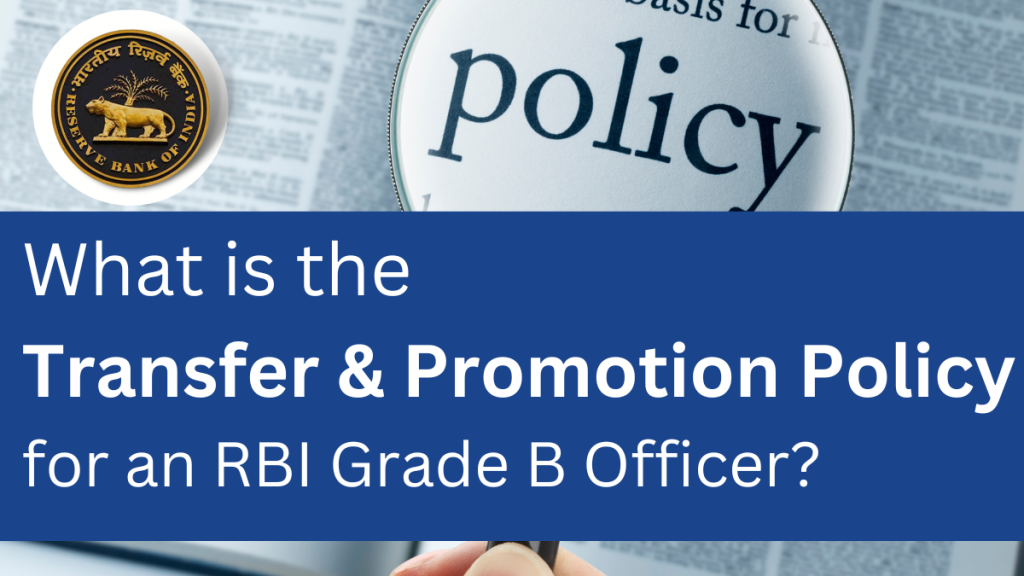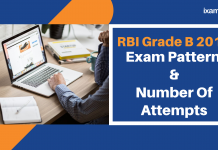Ever dreamt of a career that’s equal parts challenging and rewarding? If so, then banking exams, especially the coveted RBI Grade B Exam, might just be your golden ticket! These exams are the gateway to a stable and exciting career path in the dynamic world of finance.
Think about it: you get to work for the Reserve Bank of India, the country’s central bank, the powerhouse that calls the shots on national monetary policy. It’s not just about prestige though. Cracking these exams lands you a government job, which means excellent job security, fantastic benefits packages (think health insurance, pensions, and generous leaves), and a chance to contribute to the nation’s financial well-being.
Download the study material for free
Download PDFA critical part of any job that you aspire to is the lifestyle it affords you. Some jobs are extremely demanding with frequent travel required or a generally heavy workload. The reason why the RBI Grade B exam draws so many students is because of its lucrative promotional and posting policies. They offer successful exam qualifiers the chance to work in different departments, explore different cities and scale new heights in their career.
We will explore what life as an RBI Grade B officer is like, the opportunities for advancement to senior posts and transfer policies in the coming sections.

The RBI Grade B Exam
The RBI Grade B exam is a rigorous three-stage evaluation process designed to identify candidates with a strong foundation in finance, economics, and banking operations. It assesses not only your knowledge of core concepts but also your quantitative and analytical abilities, general awareness, and written communication skills.
The journey begins with the Prelims, a computer-based test with objective questions covering English Language, Quantitative Aptitude, Reasoning Ability, and General Awareness. Qualifying the prelims helps you progress towards the mains exam which consists of three paers. The syllabus for prelims is as follows.
| RBI Grade B Stage 1 (Prelims) | Syllabus |
| English Language | |
| Quantitative Aptitude | |
| Reasoning Ability | |
| General Awareness |
Once you clear this hurdle proceed to the Mains or the RBI Grade B Phase 2, consisting of three written papers. Paper I focuses on Economic and Social Issues (ESI) with both objective and descriptive questions. Paper II tests your English Comprehension and Writing Skills, while Paper III delves into Finance and Management through a combination of objective and descriptive formats. Finally, shortlisted candidates face an interview, the final step in securing a coveted managerial position within various departments of the RBI. The following table gives an in-depth look at the RBI Grade B syllabus and exam pattern of the Mains paper of the RBI Grade B exam.
| RBI Grade B Phase 2 (Mains) Paper I | Syllabus |
| Economic and Social Issues (ESI) Growth and Development Indian Economy Globalization Social Structure of India | |
| RBI Grade B Phase 2 (Mains) Paper II | English Comprehension Writing Expression |
| RBI Grade B Phase 2 (Mains) Paper III | Finance and Management Financial Systems Finance Markets Risk Management Corporate Governance Fundamentals of Management and Organizational Behaviour Ethics at the Workplace |
ixamBee offers exclusive RBI Grade B online courses, along with RBI Grade B mock tests and daily updates on the general awareness section through Beepedia.
To be eligible to give the exam you have to be at least 21 years old and the upper age limit is 30 years with age relaxation in place for specific circumstances. Additionally, to be eligible, you’ll need a Bachelor’s degree with a minimum score of 60% and 50% for SC/ST/PwBD applicants. This applies to both regular graduates and those with equivalent technical or professional qualifications. For post graduations degrees, the minimum percentage required for eligibility is 55% and passing marks for SC/ST/PwBD applicants.
What Does an RBI Grade B Officer Do?
The Reserve Bank of India (RBI) Grade B program offers a diverse and rewarding career path for individuals with a passion for economics, finance, and contributing to India’s financial stability. Upon successful completion of the exam, candidates can choose from over 30 specialized departments within the RBI, such as the Consumer Education and Protection Department (CEPD), Department of Banking Supervision (DBS), or the Department of Economic Policy & Research (DEPR). Each department has its own focused operations, ensuring a stimulating and ever-evolving work environment.
The RBI fosters continuous learning and development for its officers. Rotational shifts allow exposure to various facets of central banking, while regular training sessions and workshops equip officers with the latest knowledge and skills in the banking and finance domain. The career path is well-defined, offering opportunities for progression into leadership roles within the organization.
Responsibilities for RBI Grade B officers vary depending on the department assignment. Common duties include analyzing economic data, researching financial trends, and contributing to policy decisions impacting interest rates, liquidity, and inflation control. Officers also play a role in monitoring commercial bank activities to ensure regulatory compliance and contribute to overall financial stability. Additionally, they may oversee foreign exchange transactions, promote financial inclusion initiatives, and conduct research on economic and financial issues. This diverse range of responsibilities ensures a challenging and intellectually stimulating career for those who join the RBI as Grade B officers.
It becomes quite apparent that life as an RBI Officer is not just promising but has the potential to transform your skills and your life. Many aspirants wonder about the specifics of their posting and career growth opportunities and where they may have to shift to pursue their dreams. Let us take a look at the promotional and transfer policies of the RBI.
RBI Grade B Promotion Policy
The Reserve Bank of India (RBI) employs a well-defined promotional structure for its Grade B officers. Promotions in the RBI are primarily time-bound, with officers progressing through designated levels based on their years of service. This ensures a predictable career path. While time in service is a major factor, performance evaluations also play a role in promotions. These evaluations likely consider factors like quality of work, achievement of targets, and contributions to the department.
- Manager (Grade B Officer): This is the entry-level position for those who successfully clear the RBI Grade B exam. Successful qualifiers start out as Managers in different departments of the RBI.
- Assistant Manager (Grade C): Promotion to Assistant Manager typically occurs after 7 to 8 years of service as a Grade B officer. The promotion to this Grade is through performance appraisal and other aspects of your service as an employee. Depending on this performance, the promotion may be delayed by another year or two for some RBI Grade B employees.
- Manager (Grade D): After serving for a designated period of around 5 to 6 years, as a Grade C Assistant Manager, officers are promoted to the post of Manager within the RBI. To qualify for this promotion, Grade C Officers must go through an exam to assess their suitability for the promotion and the department they would be assigned to.
- Senior Manager (Grade E): This promotion usually comes after 5 to 6 years as a manager. Grade D Officers are automatically promoted to the Grade E Senior Manager post based on performance review and their track record.
- Deputy General Manager (DGM) (Grade F): After another 5 to 6 years as a Senior Manager, the Grade E Officers are eligible to progress to becoming Grade F officers. They have to appear for an interview, after which they are appointed a Deputy General Manager post as Grade F Officers,
There are still more positions of seniority within the RBI Officer hierarchy available after Grade F. Each progressing level has added responsibility. Appointment to these posts is subject to the number of vacancies and experience of the RBI Officer. With each progressing designation, the salary and opportunities to gain experience in the national financial and banking system increase.
Transfer Policy of RBI Grade B Officers
The RBI’s transfer and posting policy for Grade B officers aims to strike a balance between providing diverse work experiences. The Central Office in Mumbai is the main deciding authority regarding the transfer policy of its officers. Transfers typically occur every 2-5 years, but this isn’t a rigid rule. Officers might spend longer durations in zonal offices. The primary goal is to expose them to various departments and locations within the RBI, fostering a well-rounded skillset.
Grade B officers are transferable across India and are usually posted in RBI offices situated in various cities. The good news here is that every single RBI officer posting is in a metro city, state capital or major cities.
Following selection, Grade B officers undergo induction training at RBSC Chennai. Posting durations can vary but expect tenures of up to 4 years during the post-trial supervision period. After completion, they have an opportunity to express their preferred posting location.
It’s important to remember that getting your preferred location (home posting) is unlikely. Newly recruited officers are generally posted to Mumbai. However, if the initial posting is elsewhere, their second assignment will automatically be in Mumbai. Following the initial posting cycle, expect transfers every 3-5 years to locations outside your first assignment. These transfers are driven by the RBI’s operational needs.
While transfers between cities are common, frequent reassignments within departments at the same location can also occur. This allows you to gain experience in different areas while potentially staying in the same city. In essence, the RBI’s transfer policy prioritizes equipping officers with diverse experiences to benefit the organization. While some preferences might be considered, relocation is an integral part of the job.
Conclusion
Cracking the RBI Grade B exam is your gateway to a distinguished career path. Now that you’re armed with insights into the exam pattern, the exciting life of an RBI officer, and the bank’s promotional and transfer policies, you can embark on your journey with informed confidence. Remember, success lies in a well-structured study plan, unwavering dedication, and a thirst for knowledge. So, utilize the plethora of resources available, hone your skills, and take that first step towards becoming a vital part of India’s financial system.
To help you prepare 50% faster for competitive exams, ixamBee provides a free Mock Test Series and all the Current Affairs in English and Current Affairs in Hindi in the BeePedia capsules for GA Preparation. You can also get the latest updates for Bank PO, Bank Clerk, SSC, RBI Grade B, NABARD, and Other Government Jobs.
Also Read:
What are some dos and don’ts for the RBI Grade B exam?
Which is a Better Career for the Long Term, UPSC or RBI Grade B?
What Other Exams Can You Give if You Prepare for RBI Grade B?














